Related Research Articles

Anne Brontë was an English novelist and poet, the youngest member of the Brontë literary family.
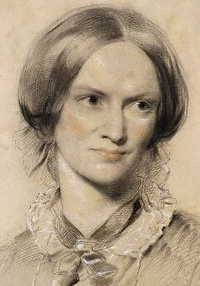
Charlotte Nicholls, commonly known as Charlotte Brontë, was an English novelist and poet, the eldest of the three Brontë sisters who survived into adulthood and whose novels became classics of English literature. She is best known for her novel Jane Eyre, which she published under the male pseudonym Currer Bell. Jane Eyre went on to become a success in publication, and is widely held in high regard in the gothic fiction genre of literature.

Emily Jane Brontë was an English novelist and poet who is best known for her only novel, Wuthering Heights, now considered a classic of English literature. She also published a book of poetry with her sisters Charlotte and Anne titled Poems by Currer, Ellis and Acton Bell with her own poems finding regard as poetic genius. Emily was the second-youngest of the four surviving Brontë siblings, between the youngest Anne and her brother Branwell. She published under the pen name Ellis Bell.

William Makepeace Thackeray was an English novelist and illustrator. He is known for his satirical works, particularly his 1847–1848 novel Vanity Fair, a panoramic portrait of British society, and the 1844 novel The Luck of Barry Lyndon, which was adapted for a 1975 film by Stanley Kubrick.
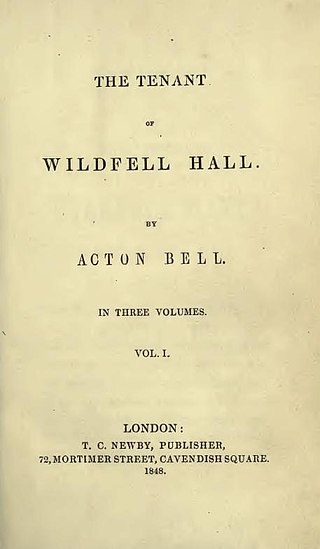
The Tenant of Wildfell Hall is the second and final novel written by English author Anne Brontë. It was first published in 1848 under the pseudonym Acton Bell. Probably the most shocking of the Brontës' novels, it had an instant and phenomenal success, but after Anne's death her sister Charlotte prevented its re-publication in England until 1854.
This article contains information about the literary events and publications of 1863.
This article contains information about the literary events and publications of 1861.
This article contains information about the literary events and publications of 1849.
Whether I shall turn out to be the hero of my own life, or whether that station will be held by anybody else, these pages must show.
This article contains information about the literary events and publications of 1847.
This article contains information about the literary events and publications of 1846.
This article contains information about the literary events and publications of 1844.
This article contains information about the literary events and publications of 1840.

The Brontës were a nineteenth-century literary family, born in the village of Thornton and later associated with the village of Haworth in the West Riding of Yorkshire, England. The sisters, Charlotte (1816–1855), Emily (1818–1848) and Anne (1820–1849), are well-known poets and novelists. Like many contemporary female writers, they published their poems and novels under male pseudonyms: Currer, Ellis, and Acton Bell. Their stories attracted attention for their passion and originality immediately following their publication. Charlotte's Jane Eyre was the first to know success, while Emily's Wuthering Heights, Anne's The Tenant of Wildfell Hall and other works were accepted as masterpieces of literature after their deaths.
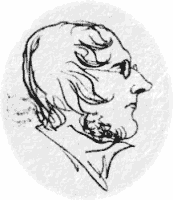
Patrick Branwell Brontë was an English painter and writer. He was the only son of the Brontë family, and brother of the writers Charlotte, Emily, and Anne. Brontë was rigorously tutored at home by his father, and earned praise for his poetry and translations from the classics. However, he drifted between jobs, supporting himself by portrait-painting, and gave way to drug and alcohol addiction, apparently worsened by a failed relationship with a married woman. Brontë died at the age of 31.

The Brontë Parsonage Museum is a writer's house museum maintained by the Brontë Society in honour of the Brontë sisters – Charlotte, Emily and Anne. The museum is in the former Brontë family home, the parsonage in Haworth, West Yorkshire, England, where the sisters spent most of their lives and wrote their famous novels.
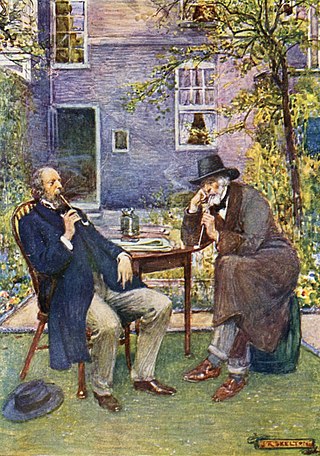
Victorian literature is English literature during the reign of Queen Victoria (1837–1901). The 19th century is considered by some the Golden Age of English Literature, especially for British novels. In the Victorian era, the novel became the leading literary genre in English. English writing from this era reflects the major transformations in most aspects of English life, from scientific, economic, and technological advances to changes in class structures and the role of religion in society. The number of new novels published each year increased from 100 at the start of the period to 1000 by the end of it. Famous novelists from this period include Charles Dickens, William Makepeace Thackeray, the three Brontë sisters, Elizabeth Gaskell, George Eliot, Thomas Hardy, and Rudyard Kipling.

The Brontë Sisters is a 1979 French biographical drama film directed by André Téchiné, who co-wrote the screenplay with Pascal Bonitzer and Jean Gruault. The film stars Isabelle Adjani, Marie-France Pisier and Isabelle Huppert as the Brontë sisters. The cinematography was by Bruno Nuytten. It was a project that Téchiné wanted to make since 1972, but only after the favourable reception of Souvenirs d'en France (1975) and Barocco (1976), he was able to find the necessary financing. Produced by Gaumont, the film's originally running time was cut from three to less than two hours upon its release at the 1979 Cannes Film Festival.
Nationality words link to articles with information on the nation's poetry or literature.
Events from the year 1848 in the United Kingdom.
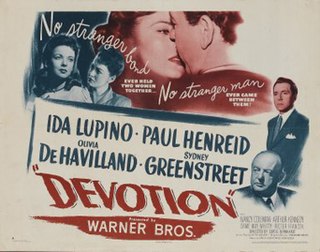
Devotion is a 1946 American biographical film directed by Curtis Bernhardt and starring Ida Lupino, Paul Henreid, Olivia de Havilland, and Sydney Greenstreet. Based on a story by Theodore Reeves, the film is a highly fictionalized account of the lives of the Brontë sisters. The movie features Montagu Love's last role; he died almost three years before the film's delayed release.
References
- 1 2 3 Alexander, Christine; Smith, Margaret (2006). The Oxford Companion to the Brontës. Oxford University Press. ISBN 978-0-19-861432-6.
- ↑ Winkler, Anita. "Initial successes. The abolition of censorship". The World of the Habsburgs. Retrieved 2014-06-06.
- ↑ Landow, G. P. "The Life of John Ruskin" . Retrieved 2013-06-21.
- 1 2 3 Claire O'Callaghan (15 June 2018). Emily Brontë Reappraised. Saraband. pp. 22–23. ISBN 978-1-912235-23-0.
- ↑ Hopkins, Annette B. (June 1948). "Mary Barton: A Victorian Best Seller". The Trollopian . 3 (1): 1–18. doi:10.2307/3044539. JSTOR 3044539.
- ↑ "Poets Hall". Art in Parliament. www.parliament.uk. Archived from the original on 2013-02-04. Retrieved 2013-02-04.
- ↑ Whibley, Charles (1903). William Makepeace Thackeray. University of California Libraries. Edinburgh : W. Blackwood. p. 125.
- ↑ Flanders, Judith (2006-08-20). "Hooked on books". The Sunday Telegraph . London. Retrieved 2015-04-10.
- ↑ Richards, Jeffrey (2002), Poole, Robert (ed.), "The 'Lancashire Novelist' and the Lancashire witches", The Lancashire Witches: Histories and Stories, Manchester University Press, pp. 166–187, ISBN 978-0-7190-6204-9
- ↑ "Mr. Newby Will Publish On The 24th, Mr. Acton Bell's Novel, The Tenant Of Wildfell Hall". The Morning Post. 23 June 1848. p. 8 – via British Newspaper Archive.
- ↑ Ross, Angus (1971). "Kingsley, Charles". In Daiches, David (ed.). The Penguin Companion to Literature. Volume 1: Britain and the Commonwealth. Harmondsworth: Penguin. p. 293. ISBN 9780070492752 . Retrieved 25 August 2013.
- ↑ Hahn, Daniel (2015). The Oxford Companion to Children's Literature (2nd ed.). Oxford. University Press. p. 14. ISBN 9780198715542.
- ↑ Benjamin Disraeli; J. B. Conacher; John Matthews (1 January 1982). Benjamin Disraeli Letters: 1848-1851. University of Toronto Press. p. 66. ISBN 978-0-8020-2927-0.
- ↑ "Ulverston Borough Council biography. Retrieved 28 June 2020". Archived from the original on 29 June 2020. Retrieved 28 June 2020.
- ↑ "Emily Bronte | Biography, Works, & Facts". Encyclopedia Britannica. Retrieved 8 April 2019.